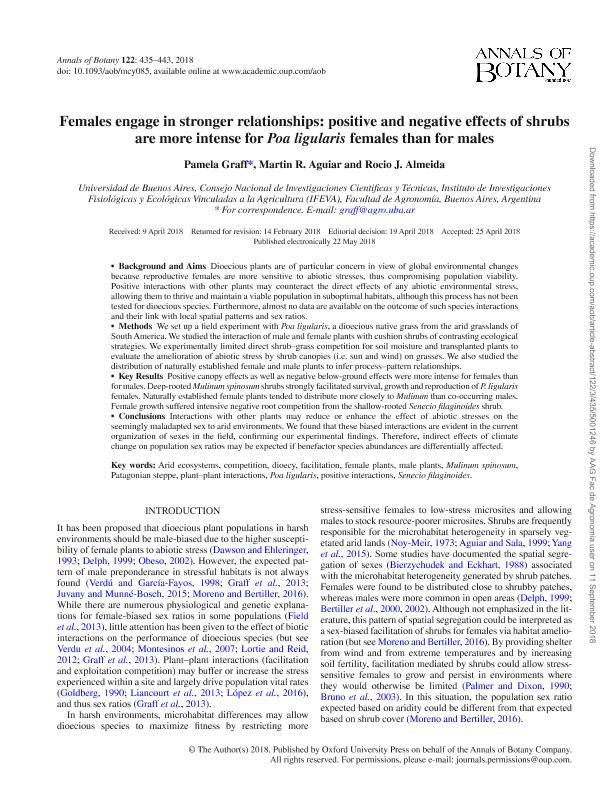Artículo
Females engage in stronger relationships: positive and negative effects of shrubs are more intense for Poa ligularis females than for males
Fecha de publicación:
09/2018
Editorial:
Oxford University Press
Revista:
Annals of Botany
ISSN:
0305-7364
Idioma:
Inglés
Tipo de recurso:
Artículo publicado
Clasificación temática:
Resumen
Background and Aims Dioecious plants are of particular concern in view of global environmental changes because reproductive females are more sensitive to abiotic stresses, thus compromising population viability. Positive interactions with other plants may counteract the direct effects of any abiotic environmental stress, allowing them to thrive and maintain a viable population in suboptimal habitats, although this process has not been tested for dioecious species. Furthermore, almost no data are available on the outcome of such species interactions and their link with local spatial patterns and sex ratios. Methods We set up a field experiment with Poa ligularis, a dioecious native grass from the arid grasslands of South America. We studied the interaction of male and female plants with cushion shrubs of contrasting ecological strategies. We experimentally limited direct shrub–grass competition for soil moisture and transplanted plants to evaluate the amelioration of abiotic stress by shrub canopies (i.e. sun and wind) on grasses. We also studied the distribution of naturally established female and male plants to infer process–pattern relationships. Key Results Positive canopy effects as well as negative below-ground effects were more intense for females than for males. Deep-rooted Mulinum spinosum shrubs strongly facilitated survival, growth and reproduction of P. ligularis females. Naturally established female plants tended to distribute more closely to Mulinum than co-occurring males. Female growth suffered intensive negative root competition from the shallow-rooted Senecio filaginoides shrub. Conclusions Interactions with other plants may reduce or enhance the effect of abiotic stresses on the seemingly maladapted sex to arid environments. We found that these biased interactions are evident in the current organization of sexes in the field, confirming our experimental findings. Therefore, indirect effects of climate change on population sex ratios may be expected if benefactor species abundances are differentially affected.
Archivos asociados
Licencia
Identificadores
Colecciones
Articulos(IFEVA)
Articulos de INST.D/INV.FISIOLOGICAS Y ECO.VINCULADAS A L/AGRIC
Articulos de INST.D/INV.FISIOLOGICAS Y ECO.VINCULADAS A L/AGRIC
Citación
Graff, Barbara Pamela; Aguiar, Martin Roberto; Almeida, Rocio Jezabel; Females engage in stronger relationships: positive and negative effects of shrubs are more intense for Poa ligularis females than for males; Oxford University Press; Annals of Botany; 122; 3; 9-2018; 435-443
Compartir
Altmétricas




